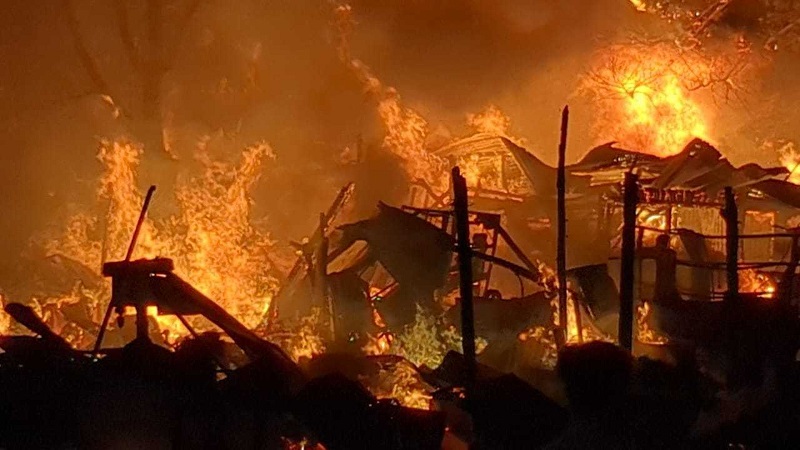Even as at least two districts in Bangladesh’s sensitive Chittagong Hill Tracts (CHT) turned volatile between September 19 and 20, a section of officers belonging to the 24th Infantry Division are suspected to have collaborated with Muslim “settlers” in attacking Chakma villages.
Bangladesh security agency sources revealed that Brigadier General Sharif Mohammad Aman Hasan, who is the Region Commander and heads the 203rd Infantry Brigade, may have played a “leading role” in providing “back-up” support to the settlers who torched Chakma villages in Khagrachari district close to the border with Tripura and Mizoram in India.
Bangladeshi sources located in the CHT said that on September 18 – a day before a localised incident involving a motorcycle-borne Muslim youth sparked off widespread violence in Khagrachari, a Bangladesh army lieutenant colonel was “scheduled to meet” some cadres of the Parbatya Chattagram Jana Samhati Samiti (PCJSS) led by Jyotirindra Bodhipriya Larma aka Santu Larma at an undisclosed location.
These PCJSS cadres, located in India, were to cross over to Bangladesh territory for this clandestine meeting. It is, however, not known whether the meeting took place.
Terming the attacks on the minority Chakma and other hill tribes as “organised”, Chakma Development Foundation of India founder Suhas Chakma said in a statement issued today that targeted assault was at the behest of the “Bangladesh army and illegal plain settlers”.
The attack on the CHT tribes comes two days after the Bangladesh Hindu Buddhist Christian Unity Council (BHBCUC) issued a statement on September 19, claiming that 2,010 violent incidents involving murder, arson, destruction of Hindu temples and properties were recorded between August 5 and 20 across Bangladesh.
Pointing out that “a section of opportunistic miscreants attacked, vandalized, looted and set fire on minority community houses, places of worship, business establishments across the country,” the BHBCUC statement added that “land has been forcibly occupied and is still getting occupied forcibly.
In some areas, women have been raped and tortured”. In the Khulna division alone, where the highest number of cases of communal violence was recorded, four Hindu women were raped, the statement said.
Besides, the statement said, the miscreants resorted to “extortion” and held out “threats” to “leave the country”.
The uncharacteristically strong statement said that “in the psychological perception of a section of people, anti-India sentiment has turned into anti-Hindu sentiment”.
While the anti-minority pogrom drew little condemnation from members of Bangladesh’s interim government and civil society, the collaboration between the army and the Muslim “settlers” in the CHT drew a sharp response from expatriate Chakma leaders.
A September 20 joint statement by seven Chakma organisations said that “over 100 houses and shops have been burnt at Dighinala Sadar under Khagrachari district.
The illegal plain settlers were accompanied by the Bangladesh Army personnel to attack the tribal houses and shops.
The Bangladesh Army personnel prevented the Chakma and other hill tribes from saving their shops/houses and offices”.
The Chakma leaders claimed that nine tribal people were killed on September 19 in the wake of the attacks by the 204th Infantry Brigade and hundreds of Muslim ‘settlers’.















